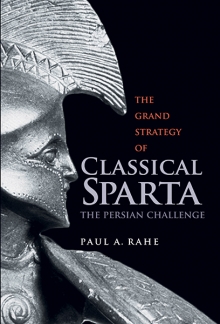Paul A. Rahe
Historian, Professor and Author
The Spartan Regime: Its Character, Origins, and Grand Strategy (Yale Library of Military History)For centuries, ancient Sparta has been glorified in song, fiction, and popular art. Yet the true nature of a civilization described as a combination of democracy and oligarchy by Aristotle, considered an ideal of liberty in the ages of Machiavelli and Rousseau, and viewed as a forerunner of the modern totalitarian state by many twentieth-century scholars has long remained a mystery. In a bold new approach to historical study, noted historian Paul Rahe attempts to unravel the Spartan riddle by deploying the regime-oriented political science of the ancient Greeks, pioneered by Herodotus, Thucydides, Plato, Xenophon, and Polybius, in order to provide a more coherent picture of government, art, culture, and daily life in Lacedaemon than has previously appeared in print, and to explore the grand strategy the Spartans devised before the arrival of the Persians in the Aegean. Available from Amazon.com, Yale University Press, and bookshops everywhere. |
|
The Grand Strategy of Classical SpartaMore than 2500 years ago a confederation of small Greek city-states defeated the invading armies of Persia, the most powerful empire in the world. In this meticulously researched study, Dr. Rahe argues that Sparta was responsible for the initial establishment of the Hellenic defensive coalition and was, in fact, the most essential player in its ultimate victory. Drawing from an impressive range of ancient sources, including Herodotus and Plutarch, the author veers from the traditional Atheno-centric view of the Greco-Persian Wars to examine from a Spartan perspective the grand strategy that halted the Persian juggernaut. Rahe provides a fascinating, detailed picture of life in Sparta circa 480 B.C., revealing how the Spartans’ form of government and the regimen to which they subjected themselves instilled within them the pride, confidence, discipline, and discernment necessary to forge an alliance that would stand firm against a great empire, driven by religious fervor, that held sway over two-fifths of the human race. The Grand Strategy of Classical Sparta is available from Amazon.com, Yale University Press, and fine booksellers everywhere. |
|
Soft Despotism, Democracy's Drift
Rahe argues that Montesquieu, Rousseau, and Tocqueville all anticipated the modern liberal republic's propensity to drift in the direction of “soft despotism”—a condition that arises within a democracy when paternalistic state power expands and gradually undermines the spirit of self-government. Such an eventuality, feared by Tocqueville in the nineteenth century, has now become a reality throughout the European Union, Canada, Australia, New Zealand, and the United States. So Rahe asserts, and he explains what must be done to reverse this unfortunate trend. Read more... | Available at Amazon.com |
|
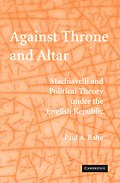
|
Against Throne and Altar: Machiavelli and Political Theory Under the English Republic
Exploring the English republican experiment conducted between the reigns of Charles I (d. 1649) and Charles II (c. 1660), Rahe examines early republicanism through the thought of John Milton, Marchamont Nehdham, James Harrington and Thomas Hobbes; especially contrasted against the earlier republicanism of Machiavelli. Available at Amazon.com |
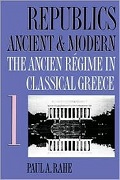
|
Republics Ancient & Modern I: The Ancient Regime in Classical GreeceThe first in a three part series, Regimes bridges the gap between political theory, comparative history and government, and constitutional prudence, Rahe challenges prevailing interpretations of ancient Greek republicanism, early modern political thought, and the founding of the American republic. Read reviews of Republics, Ancient and Modern or Available on Amazon.com |
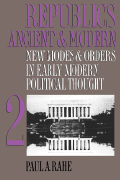
|
Republics Ancient & Modern II: New Modes & Orders in Early Modern Political ThoughtContinuing Dr. Rahe's examination of republican political thought, focusing on Renaissance and Enlightenment thought. Available at Amazon.com |
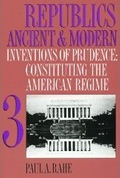
|
Republics Ancient & Modern III: Inventions of Prudence, Constituting the American RegimeThe third volume continues the discussion of republican thought through the American founding period. Available at Amazon.com |

|
Machiavelli's Liberal Republic LegacyThe significance of Machiavelli's political thinking for the development of modern republicanism is a matter of great controversy. In this volume, a distinguished team of political theorists and historians reassess the evidence, examining the character of Machiavelli's own republicanism; charting his influence on Marchamont Nedham, James Harrington, John Locke, Algernon Sidney, John Trenchard, Thomas Gordon, David Hume, the baron de Montesquieu, Benjamin Franklin, George Washington, John Adams, Thomas Jefferson, James Madison, and Alexander Hamilton; and arguing that, while Machiavelli was himself no liberal, he did set the stage for the emergence in England of liberal republicanism, he provided the foundations for a moderation of commonwealth ideology by the exponents of commercial society, and he exercised considerable, if circumscribed, influence on the statesmen who founded the American Republic. Machiavelli's Liberal Republican Legacy will be of great interest to political theorists, early modern historians, and students of the American political tradition. Available at Amazon.com |

|
Montesquieu's Science of Politics: Essays on The Spirit of Laws
Co-edited with David W. Carrithers and Michael A. Mosher, a collection of essays dedicated to analyzing Montesquieu's contributions to political science, reviewing some of the most vexing controversies that have arisen in the interpretation of his thought. Available at Amazon.com |

